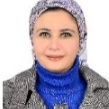
Abeer T. Khalil
Work place: Mansoura University / Communication and Electronics Engineering Department, Mansoura, 35516, Egypt
E-mail: abeer.twakol@mans.edu.eg
Website: https://orcid.org/0000-0003-4223-2144
Research Interests: Network Security, Network Architecture, Hardware Security, Computer Networks
Biography
Abeer T. Khalil received the B.Sc. and Ph.D. degrees from the Electronics and Communications Engineering Department, Faculty of Engineering, Mansoura University, in 2001 and 2013, respectively. She is currently working as an Associate Professor at the Electronics and Communications Department, Faculty of Engineering, Mansoura University. She has published more than 30 articles and supervised ten postgraduate students in many universities. She is interested in wireless networking and hardware realizations of digital system.
Author Articles
Privacy Enhancing for Fog Computing based - IoT
By Samaa Y. Tarabay Ibrahim Yasser Ahmed S. Samrah Abeer T. Khalil
DOI: https://doi.org/10.5815/ijwmt.2023.03.01, Pub. Date: 8 Jun. 2023
With the massive inflation of newly developed technologies, recourse to data has become a necessity in light of the current inflation and excessive need dominating the world and developed societies. According to the control of millions of smart devices and sensors connected to an interconnected and controlled automated system within installed scales due to the services provided by IOT devices through the created fog layer that connects the cloud centers and those devices, in addition, very large amounts of that data including public and private are passed through the connection of Internet of Things devices to each other. Smart and advanced networks as one of the fog computing applications play a prominent and accurate role in the infrastructure for reliable and sound data transmission. Accordingly, the process of data aggregation is an important and common matter in the world of fog-enhancing Internet of Things, so preserving the privacy of that data is a matter of concern, and based on this principle, we propose in this paper a model for data aggregation that maintains privacy using a foggy computing environment called PPFDA (privacy preserving based- fog computing data aggregation). We use in our scheme DF homomorphic cryptosystem as it consider one of the aggregation models that ensures the privacy purpose. The theoretical results and analyzes show that our design is ensuring the privacy of data during collection using an algorithm of DF. The results confirm that the proposed scheme achieves security and privacy purposes in modern network systems for the Internet of things based in fog computing. In addition, it contributes significantly to the efficient performance of storage operations.
[...] Read more.Other Articles
Subscribe to receive issue release notifications and newsletters from MECS Press journals